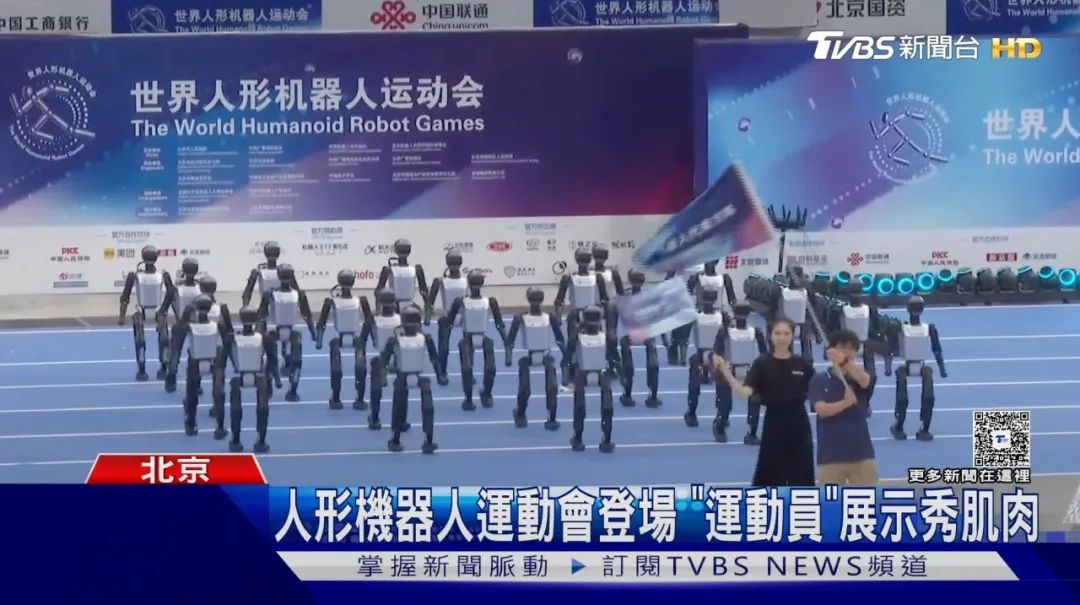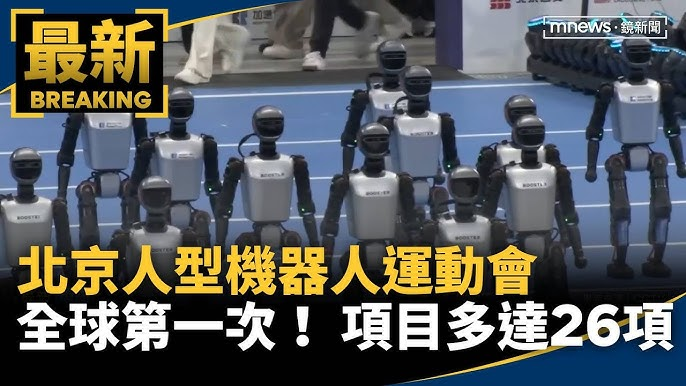In recent days, the "2025 World Humanoid Robot Games," the world's first comprehensive sports event featuring humanoid robots, has captured global attention and sparked heated discussion on Taiwan.
Taiwan's TVBS News channel broadcast the event, and local media outlets such as Central News Agency and Financial Weekly covered it with headlines such as "The Robot Revolution Has Begun," praising it as "like the Olympics of robotics." Taiwanese netizens posted on PTT, Taiwan's largest forum, detailing the events and relishing the highlights and humor. Some young Taiwanese attended the event specifically to watch it, marveling at the fact that "the latest technology and the brightest future are all being realized here."

Screenshot of media reports on the island
Mr. Tan interviewed Taiwanese scholar Lin Chengduo, director of the Department of Economics at the Sino-French Institute of Renmin University of China. He said that the reason why this sports event has received unprecedented attention is that humanoid robots are currently leading the trend, promoting the rapid development of related technologies and industrial chains, thereby driving the overall industrial transformation and economic growth of the mainland, and will further benefit the world.

Screenshots of Taiwanese media reports
Tan Zhu observed that Taiwanese society is intensely interested in the humanoid robot games, not only amazed by the excitement on the field but also by their extraordinary significance beyond the competition.
"More than just the Olympics of the Robot World"
The "2025 World Humanoid Robot Games" will feature events such as 5v5 football, 400m, 1500m, basketball, free fighting, and table tennis, many of which are firsts in history. Taiwan's United News Network reported that the 5v5 humanoid robot football match is a world first, with 10 robots competing against each other without human intervention, showcasing their advanced technological prowess. Several Taiwanese media outlets reported on the 1500m final, the first gold medal of the Games. Today's news report stated that "the winning robot finished in 6 minutes and 34 seconds, a speed considered average for an average adult male." Regarding the first gold medal winner, the robot that performed the yangko dance on this year's Spring Festival Gala, some Taiwanese netizens praised it, saying, "It's a great combination of both cultural and sports, and a lot of talent." Former TVBS news anchor and Taiwanese youth Zhai Xuan flew from Taiwan to Beijing to watch the competition. She told Mr. Tan at the sidelines, "The robot athletes are all very coordinated and move very fast. It's incredible."

Screenshot of Taiwanese media reports
This Games featured not only athletic competitions but also competitions in numerous application scenarios. Lin Qianxi, a Taiwanese student studying in mainland China, said her favorite part was watching the robot contestants simulate real-life scenarios, performing tasks like medicine sorting, heavy-lifting, and welcoming guests. This suggests that robots will become more integrated into society and into every household, bringing greater convenience. Taiwanese youth Lin Jingmao told Tan Zhu, "This Games is both the Olympics of robotics and more. It paints a picture of robotics, from the laboratory to the competition arena and into our daily lives."
Tan Zhu noted that Taiwanese public opinion, when discussing the Games, consistently cited the "rapid progress" of mainland China's robotics technology. Taiwan World News Network published an article stating that from the world's first humanoid robot half marathon, to the 10th World Robot Conference, to the 2025 World Humanoid Robot Games, the wave of "robot mobilization" events showcases the accelerating pace of mainland China's robotics industry. One Taiwanese netizen commented, "There were quite a few 'embarrassments' at the recent robot marathon, but I didn't expect such rapid progress in just a few months. Every appearance brings new breakthroughs and surprises, always reaching the next level."
Scholars specializing in artificial intelligence (AI) in Taiwan pointed out that the World Humanoid Robot Games is a concentrated showcase of the current achievements in mainland China's robotics technology. Through continuous trial and error, improvement, and accumulation of experience, mainland China's robotics are already growing and iterating at a monthly rate, or even faster.
"The significance beyond the arena is even more extraordinary."
Not only is the focus on the arena, but Taiwanese public opinion is also actively discussing the significant implications of the rapid development of humanoid robots beyond the arena.
First, the field of humanoid robots is experiencing an unprecedented surge in attention, which is driving rapid technological progress. Taiwan Today News reported a significant increase in the number of casual viewers of mainland China's robotics competitions. Taiwanese current affairs commentator Lai Yueqian stated on a Taiwanese television political program that the more attention there is, the more it will stimulate the development of robotics technology. Lin Chengduo told Tan Zhu that high levels of social attention will lead to a concentration of resources, policy support, technical talent, and application scenarios. Mainland China is currently in this positive cycle of attention, investment, and breakthroughs, achieving systematic acceleration driven by policies, industries, and ecosystems.
In addition to the development of its own technologies, humanoid robots have become a key engine driving industrial transformation and economic growth in mainland China. Lin Chengduo stated that the development of humanoid robots requires the highly integrated and coordinated support of multiple key industries, including artificial intelligence and machine learning, sensing and control systems, materials and manufacturing technologies, chips, and high-performance computing. These technological developments are bound to promote the formation of a vast upstream and downstream industrial chain, thereby driving overall industrial innovation and high-quality employment opportunities. Yin Qiming, former head of Taiwan's Ministry of Economic Affairs, wrote that mainland China has demonstrated endless vitality and impressive achievements in innovative activities such as robotics, supporting stable economic growth.

Even more commendable on the island is that mainland China also upholds the principle of openness and win-win cooperation in the field of humanoid robotics, driving global development and benefiting people worldwide. Taiwan Good News and other Taiwanese media outlets have reported that mainland China's hosting of international events such as the World Humanoid Robot Games provides a platform for foreign counterparts to absorb technology and experience, injecting new momentum into the development of the global robotics industry. Taiwanese youth Qiu Qingling praised the platform provided by mainland China, stating that teams from different countries are learning from each other and promoting global exchange and development in this field. Taiwanese scholars told Tan Zhu that from a long-term perspective, humanoid robotics is not just a competition among individual countries or companies, but a collective solution for humanity to address challenges such as an aging population, labor shortages, and disaster relief.
During his conversation with Tan Zhu, Taiwanese compatriots spoke most frequently of their pride in being Chinese. Nearly every young Taiwanese exclaimed, "Our motherland is truly powerful," and "Countless imaginations have become reality." Tan Zhu expressed his belief that under the motherland's principle of continuous innovation, progress, and openness and win-win development, the brightest future for every Chinese has arrived.


